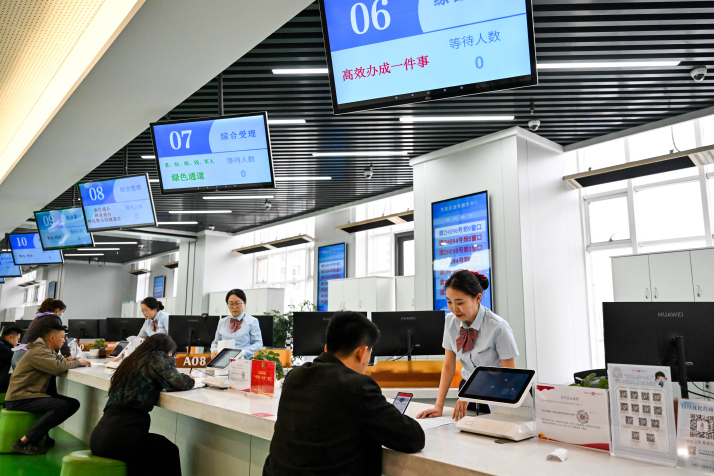| Voice |
| Policy-sensitive and market-driven | |
|
|
|
China’s private sector began to take off following the launch of its reform and opening-up policy in 1978. In the two decades before this pivotal policy was adopted, the private sector was almost non-existent due to the government's emphasis on public ownership. Since 1978, the government has been committed to both consolidating and developing the public sector of the economy, and encouraging, supporting and guiding the development of the private sector.
In a recent interview with Beijing Review, Cui Lili, a research fellow with the Institute of Chinese Modernization Studies at the Shanghai University of Finance and Economics, shared her insights into the Chinese Government's vision for the private sector.
 A staff member of Hangzhou Yushu Technology Co. Ltd., also known as Unitree Robotics, a private robotics company based in Hangzhou, Zhejiang Province, demonstrates a robotic dog at the Hannover Messe 2025 trade show in Hannover, Germany, on April 1 (XINHUA)
Beijing Review: What is President Xi Jinping's vision for China's private sector? What are his main goals for its development? Cui Lili: On February 17, President Xi delivered a speech at a symposium on private enterprises, expressing his hope that private enterprises will become a major force in advancing Chinese modernization and achieving the great rejuvenation of the Chinese nation. The private sector plays an irreplaceable role in promoting high-quality development, driving technological innovation, expanding employment and improving people's wellbeing. The future development of the private sector should focus on deepening industrial collaboration and adhere to a pattern that complements and reinforces the public sector of the economy. At the same time, it is essential to respond proactively to macro policy orientations and align deeply with regional development strategies. A mechanism for coordination should be put into practice in areas such as policy alignment and project cooperation, with the government providing the strategic guidance and enterprises implementing it. This will ultimately lead to improvement in both economic and social benefits, injecting the strong momentum of coordinated innovation into high-quality economic development. At the symposium you mentioned, Xi reaffirmed the commitment to "encouraging, supporting and guiding the development of the private sector." What does "encouraging, supporting and guiding" mean exactly? The term "encouraging" refers to boosting the confidence of private entrepreneurs. Amid multiple internal and external challenges, Xi emphasized the need to recognize the development prospects of enterprises and to strengthen strategic resolve—this serves as a powerful affirmation and motivation for businesses. We can clearly sense that the private sector is not being sidelined; rather, it remains an indispensable part of the country's high-quality development. "Supporting" is more reflected in policies on optimizing the development environment and strengthening the provision of essential resources for private enterprises. In recent years, from tax and fee reductions to financing support and the ongoing improvement of the business environment, the central and local governments have introduced a series of substantive measures aimed at private enterprises. These efforts ensure a level market playing field, enabling companies to focus more on their core businesses and pursue growth with greater autonomy and confidence. "Guiding" focuses on steering private enterprises toward higher-quality development on the basis of legal compliance and improved corporate governance. This is not merely an economic issue—it also involves social responsibility and alignment with national strategies. Private enterprises are being guided to engage in technological innovation, participate in regional coordinated development and integrate into the Belt and Road Initiative (BRI). (The China-proposed BRI aims to boost connectivity along and beyond the ancient Silk Road routes—Ed.) This not only expands development opportunities but also enhances enterprises' sense of alignment with national strategies and their sense of social responsibility. The three principles—"encouraging, supporting and guiding"—embody Xi's commitment to enabling the private sector to continue exploring the Chinese market and participating in global competition. What are the main policies China has in place to support the development of its private sector? China's current policies supporting the development of the private economy primarily focus on four key areas: legal safeguards, optimization of the business environment, incentives for technological innovation and improvement of the policy framework. On the legal front, the landmark Law on the Promotion of the Private Economy was adopted earlier this year. This is China's first fundamental legislation dedicated to the private sector. It clearly affirms the important role of the private economy within the national economic system and incorporates the principles of "encouraging, supporting and guiding" the development of the private sector into law, providing a solid legal foundation for the growth of private enterprises. Optimizing the business environment remains a key priority. In recent years, the government has worked hard to remove market entry barriers, eliminate unreasonable restrictions and preconditions and ensure that private enterprises can access all types of markets on an equal footing. At the same time, comprehensive implementation of fair competition policies has been strengthened, with more robust anti-monopoly enforcement and efforts to curb local protectionism and practices that distort market order such as transactions with designated targets. In terms of technological innovation, the government encourages private enterprises to increase research and development (R&D) investment and participate proactively in overcoming critical technology bottlenecks and making breakthroughs in frontier technologies. Measures such as tax incentives and innovation fund support are being used to enhance the capacity of private firms in key areas like advanced manufacturing, new energy and AI. Additionally, policies encourage companies to accelerate digital transformation and technological upgrading. This includes support for the R&D of generic digital technologies, as well as participation in the construction and innovative application of new infrastructure such as data centers and the industrial Internet. The focus is on the promotion of cost-effective, modular smart manufacturing equipment among small and medium-sized enterprises to enhance standardization and product quality. What we are witnessing today is that China's support for the private economy has moved far beyond slogans—manifesting instead in concrete, multidimensional actions that foster a fairer and more sustainable institutional environment for the long-term development of private enterprises.  Staff provide services related to private enterprises at the government service center of Dongsheng District in Ordos, Inner Mongolia Autonomous Region, on April 16 (XINHUA)
What is your view of the relationship between the private sector and the public sector? The relationship between China's private and state-owned sectors has always been one of mutual reinforcement and common development. Together, they have formed a complementary division of labor within the national economy, jointly serving economic growth, social stability and national strategic objectives. State-owned enterprises (SOEs) are primarily concentrated in strategic industries and are engaged in infrastructure development. They are essential to safeguarding national security and ensuring economic stability. Private enterprises contribute substantially to innovation, employment and market vitality. They are efficiency-driven, highly responsive to market demands and instrumental in driving industrial and consumer upgrades. Today, Chinese private enterprises are increasingly representing the country in global competition, particularly in high-end manufacturing and the Internet economy, playing an important role in enhancing China's international industrial influence and discourse power. As China's economy continues to evolve, the roles of both SOEs and private enterprises are also shifting. The government emphasizes the principle of unswervingly consolidating and developing the public sector and encouraging, supporting and guiding the development of the non-public sector. This approach aims to foster coordinated development and complementary advantages between the two. For example, an increasing number of private enterprises are participating in major national initiatives such as the BRI and carbon neutrality efforts, gradually transitioning from being purely "market players" to "executors of national strategies." China's unique economic strength lies in the sound interplay between an "efficient market" and a "well-functioning government." State-owned and private sectors are not engaged in a zero-sum game; rather, they form a collaborative "stabilizer and source of vitality" model through division of labor and cooperation. Looking ahead, both sectors are expected to deepen their collaboration across multiple fields, jointly shaping a more resilient and competitive modern industrial system. What are the distinctive features of China's private sector? Compared to Western private enterprises, which have grown over a long period through stages such as free competition and industry consolidation, Chinese private enterprises developed and expanded within an economic structure dominated by the public ownership, with many early forms taking shape as individual businesses or small workshops. The government plays a crucial role in promoting the rapid growth of the private economy by easing market access and providing supportive policies. This distinct developmental trajectory has shaped the unique characteristics of China's private sector. Private enterprises in the country are diverse and highly adaptive, comprising not only large conglomerates but also a vast number of small and micro-sized firms that are highly efficient and specialized. These businesses exhibit strong resilience and adaptability amid market fluctuations. Moreover, they are widely distributed—not only active in traditional labor-intensive industries such as manufacturing but also rapidly expanding in emerging sectors such as technology, finance and the Internet. Compared to private enterprises in other countries, Chinese private firms demonstrate a higher degree of "efficiency" in several respects. They are highly attuned to the domestic market, capable of quickly detecting changes in consumer demand and adjusting their strategies accordingly. They are also marked by a strong sense of innovation and flexibility, often pioneering bold explorations in business models and digital technology applications. Most notably, China's private sector has shown an exceptional ability to align itself with policy directions and respond swiftly to national strategies. From the initiatives to increase China's manufacturing prowess and accelerate low-carbon transition to the implementation of national policies of rural revitalization and common prosperity, private enterprises have actively participated across the board. Their characteristics of being both "policy-sensitive" and "market-driven" are a key reason why Chinese private enterprises remain dynamic and resilient in today's complex and evolving environment. BR Copyedited by G.P. Wilson Comments to yanwei@cicgamericas.com |
|
||||||||||||||||||||||||||||||
|